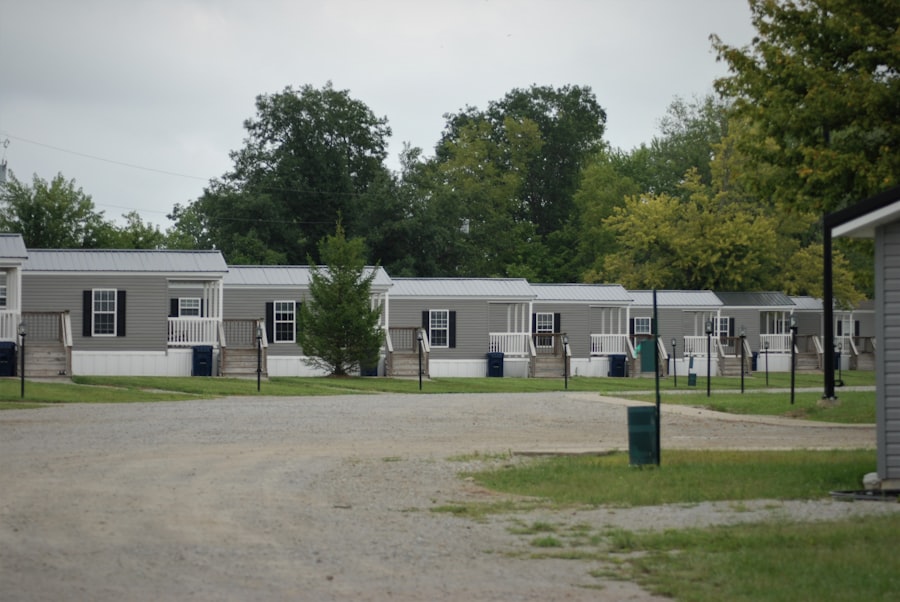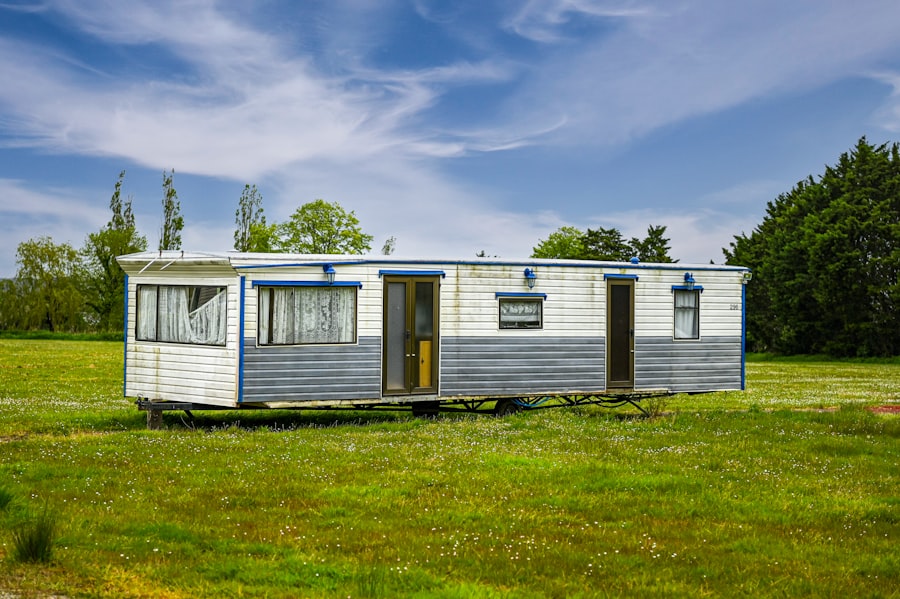Trailer homes, often referred to as manufactured or mobile homes, have gained significant popularity in recent years, particularly when paired with land for sale. One of the primary benefits of owning a trailer home on its own parcel of land is the affordability it offers. Compared to traditional site-built homes, trailer homes typically come at a lower price point, making them an attractive option for first-time homebuyers or those looking to downsize.
The cost savings extend beyond the initial purchase; lower property taxes and utility bills can also contribute to long-term financial benefits. This affordability allows homeowners to allocate their resources toward other investments or savings, enhancing their overall financial stability. Another significant advantage of trailer homes with land is the flexibility they provide.
Homeowners can choose to customize their living space according to their preferences and lifestyle needs. With land ownership, there is often the opportunity to expand or modify the property, whether that means adding a garden, building a deck, or even constructing additional structures like a shed or workshop. This level of customization is often limited in traditional housing developments, where strict zoning laws and homeowner association rules can restrict modifications.
Furthermore, owning land allows for greater privacy and a connection to nature, as many trailer homes are situated in rural or semi-rural areas, providing residents with scenic views and outdoor recreational opportunities.
Key Takeaways
- Trailer homes with land offer affordable and flexible living options with added privacy.
- Choosing the right location is crucial for convenience, safety, and lifestyle preferences.
- Understanding all costs, including land, home, and utilities, helps in budgeting effectively.
- Customization allows homeowners to tailor their trailer homes to meet personal needs and style.
- Exploring financing options and legal requirements ensures a smooth purchasing process.
Finding the Right Location for Your Trailer Home
Selecting the right location for a trailer home is crucial to maximizing its benefits. Factors such as proximity to essential services, schools, and employment opportunities should be carefully considered. For instance, a trailer home situated in a rural area may offer tranquility and space but could be far from grocery stores, healthcare facilities, and schools.
Conversely, a location closer to urban centers may provide convenience but could come with higher costs and less privacy. Therefore, potential buyers should weigh their priorities—whether they value peace and quiet or accessibility to urban amenities. In addition to considering the surrounding infrastructure, prospective homeowners should also evaluate the land itself.
The topography, soil quality, and climate can significantly impact the livability of a trailer home. For example, flat land may be ideal for installation and stability, while hilly terrain could pose challenges for drainage and accessibility. Additionally, understanding local zoning regulations is essential; some areas may have restrictions on where trailer homes can be placed or how they can be modified.
Researching local communities and visiting potential sites can provide valuable insights into the lifestyle that each location offers, helping buyers make informed decisions about where to establish their new home.
Understanding the Costs of Trailer Homes with Land for Sale

When considering the purchase of a trailer home with land, it is essential to have a comprehensive understanding of the associated costs. The initial price of the trailer itself is just one component; prospective buyers should also factor in expenses such as land acquisition costs, property taxes, insurance premiums, and ongoing maintenance expenses. For instance, while trailer homes may be less expensive than traditional homes, buyers should be aware that financing options can vary significantly based on the type of home and its location.
Some lenders may require higher down payments for manufactured homes compared to conventional mortgages. Moreover, ongoing costs can add up quickly. Utilities such as water, electricity, and sewage disposal may differ from those in traditional homes, especially if the trailer is located in a rural area where well water or septic systems are used.
Homeowners should also consider maintenance costs; while trailer homes are generally easier to maintain than traditional houses, they still require regular upkeep such as roof inspections, plumbing checks, and exterior maintenance. Understanding these costs upfront can help buyers budget effectively and avoid financial strain in the future.
Customizing Your Trailer Home to Fit Your Needs
| Customization Aspect | Common Options | Typical Size/Dimension | Estimated Time to Complete | Impact on Comfort |
|---|---|---|---|---|
| Interior Layout | Open floor plan, Separate rooms, Loft space | Varies (200-800 sq ft) | 1-3 weeks | High |
| Storage Solutions | Built-in cabinets, Under-bed storage, Overhead shelves | Custom fit to space | 3-7 days | Medium |
| Kitchen Upgrades | Compact appliances, Foldable counters, Additional cabinetry | Varies (4-8 sq ft counters) | 1-2 weeks | High |
| Bathroom Customization | Shower size, Composting toilet, Vanity options | Varies (15-30 sq ft) | 1-2 weeks | High |
| Exterior Modifications | Awning, Deck, Additional windows | Varies | 1-3 weeks | Medium |
| Insulation & Climate Control | Upgraded insulation, Mini-split AC, Portable heaters | N/A | 3-5 days | High |
| Electrical & Lighting | LED lighting, Solar panels, Additional outlets | N/A | 1 week | High |
One of the most appealing aspects of owning a trailer home is the ability to customize it according to personal preferences and lifestyle needs. Unlike traditional homes that may come with fixed layouts and designs dictated by builders or developers, trailer homes offer a blank canvas for homeowners to express their creativity. From choosing interior finishes like flooring and cabinetry to modifying the layout for better functionality, the possibilities are vast.
For example, homeowners might opt for an open-concept design that maximizes space or incorporate energy-efficient appliances that reduce utility costs. Additionally, outdoor customization is another avenue for personalization. With land ownership comes the opportunity to create outdoor living spaces that enhance the overall enjoyment of the property.
Homeowners can design patios, gardens, or even outdoor kitchens that reflect their lifestyle and preferences. Landscaping choices can also play a significant role in creating an inviting atmosphere; planting trees for shade or installing flower beds can transform a simple plot of land into a beautiful oasis. This level of customization not only enhances the aesthetic appeal of the home but also contributes to a sense of ownership and pride in one’s living space.
Financing Options for Trailer Homes with Land for Sale
Financing a trailer home with land presents unique challenges compared to traditional home purchases. Many lenders offer specific loan products tailored for manufactured homes; however, these loans often come with different terms and conditions than conventional mortgages. For instance, some lenders may require higher interest rates or larger down payments due to perceived risks associated with manufactured housing.
It is crucial for potential buyers to shop around and compare various financing options to find the best fit for their financial situation. In addition to traditional bank loans, alternative financing options may be available. Some buyers may consider personal loans or even seller financing arrangements if purchasing directly from an owner.
Government-backed loans through programs like FHA (Federal Housing Administration) or VA (Veterans Affairs) loans can also provide favorable terms for eligible buyers looking to finance both the trailer home and the land it sits on. Understanding these various financing avenues can empower buyers to make informed decisions that align with their financial goals.
Legal Considerations When Purchasing a Trailer Home with Land

Navigating the legal landscape when purchasing a trailer home with land requires careful attention to detail. One of the first steps is ensuring that the land is zoned appropriately for residential use and that there are no restrictions on placing a manufactured home on the property. Local zoning laws can vary significantly from one municipality to another; therefore, prospective buyers should consult local government offices or real estate professionals familiar with local regulations.
Additionally, it is essential to review any existing liens or encumbrances on the property before finalizing a purchase. Title searches can reveal any outstanding debts associated with the land that could affect ownership rights. Buyers should also consider obtaining title insurance to protect against potential claims against the property in the future.
Understanding these legal considerations not only safeguards buyers’ investments but also ensures compliance with local laws and regulations.
Maintenance and Upkeep of Trailer Homes with Land
Maintaining a trailer home on its own land involves specific responsibilities that homeowners should be prepared for. Regular upkeep is essential to ensure longevity and comfort within the home. This includes routine inspections of critical systems such as plumbing, electrical wiring, and HVAC (heating, ventilation, and air conditioning).
Unlike traditional homes built on solid foundations, trailer homes may require additional attention due to their unique construction methods and materials. Exterior maintenance is equally important; homeowners should regularly check for signs of wear on roofing materials and siding. Proper drainage around the home is crucial to prevent water damage or flooding during heavy rains.
Landscaping maintenance also plays a role in preserving property value; keeping lawns mowed and gardens tended not only enhances curb appeal but also prevents pest infestations that could affect both the home and surrounding environment.
Exploring Community Amenities for Trailer Home Living
Living in a trailer home often means being part of a community that offers various amenities designed to enhance residents’ quality of life. Many trailer parks or manufactured home communities provide shared facilities such as swimming pools, playgrounds, clubhouses, and recreational areas that foster social interaction among residents. These amenities can create a sense of belonging and community spirit that enriches daily life.
Moreover, some communities are strategically located near essential services such as grocery stores, healthcare facilities, and schools, making them convenient places to live. Access to public transportation can also be an advantage for those who rely on it for commuting purposes. Exploring these community amenities not only helps potential buyers assess their living environment but also provides insight into the lifestyle they can expect as part of their new community.



